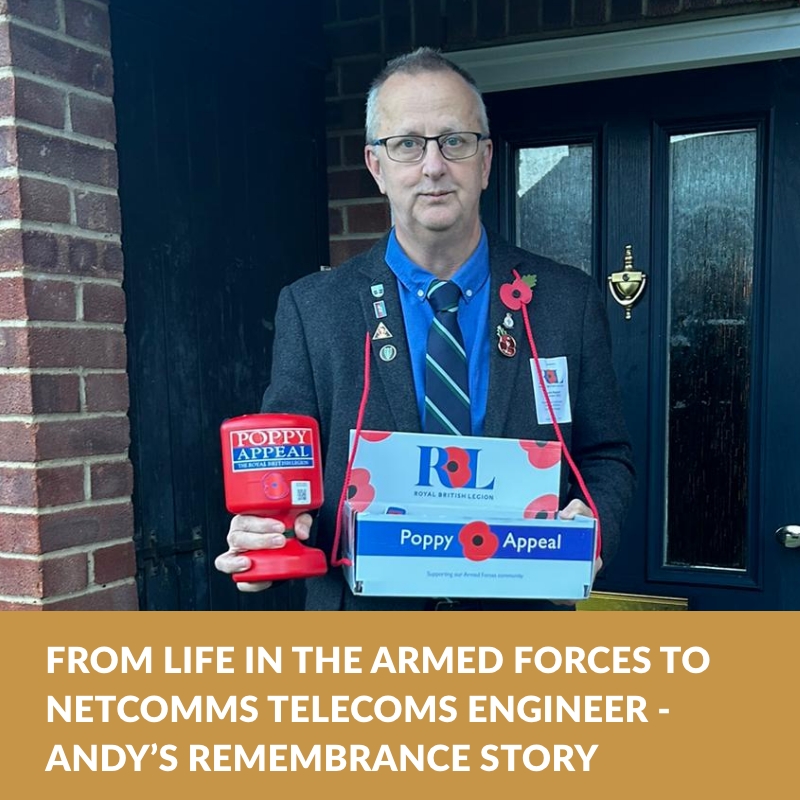Every year, on 11th November, we hold a two-minute silence in memory of those who bravely fought, and selflessly lost their lives in the line of duty.
When we say the word army, the first thing that comes to mind is a soldier. But like every organisation, the Army needs soldiers with a diverse range of skillsets. From operations to linguistics, mechanics to engineers, specialists trained through the Army are working hard behind the scenes to execute essential roles.
In the lead up to this year’s Remembrance weekend, we sat down with Net Tech Group’s ex-army Systems Engineer, Andy Pearce, to learn first-hand what life was like as a trained communications engineer in the UK military. We discovered the importance of this key role in post-conflict zones, and how learning a trade prepared him for a career beyond the Armed Forces.
From military training to military trade
It’s 1979 and Andy is just 16 years’ old. He’d always seen himself joining the Army. His father, who fought in the war, was a member of the Air Force, and combined with his love of the outdoors, Andy set his sights on joining the Royal Electrical and Mechanical Engineers as a Vehicle Mechanic. At this time, there was a shortage of Communications Engineers, and after some persuasion, Andy followed down this path.
His first time away from home and adjusting to military life, upon joining the Royal Corp of Signals, Andy spent 2.5 years at the Army Apprentice College in Harrogate, completing his necessary military and technical training.
His roles were varied, jobs included Systems Controller, Detachment Commander, and Equipment Repairer. Being responsible for mobile telephone exchanges and repairing various military communications equipment meant no two days were the same.
But conflict could be just around the corner, and Andy was required to be prepared for combat at a moment’s notice, he recalls, “They always say you’re a soldier first and a tradesman second.”
From Germany to the Falkland Islands
Wherever he was required, Andy was sent. This saw him land in various locations, overseeing communications infrastructure and operations.
After training, he was sent to the 3rd Armoured Division HQ and Signal Regiment in Germany as part of the British Army of the Rhine, travelling the countryside setting up communications networks in the event of an attack from what was then the USSR. Much of what Andy learned during his years in Germany he still uses today in his role here at Netcomms.
From meeting a member of the Royal family to spending weeks in the forests of Germany with a close-knit team building friendships and camaraderie, life in the Army was varied and interesting.
Communications Engineers were, and still are, essential to operational objectives. Before the age of the internet, Andy’s team were working with complicated equipment, and serving as a central hub. The products and systems included Cryptographic Equipment, Trunk Radio Systems, TDM & FDM Multiplexers, Manual, Electromechanical & Digital Phone Systems, Teleprinters & Satellite Receivers.
In the aftermath of the Falklands war, Andy was posted to Port Stanley. Surrounded by scenes of the conflict, including aircraft wrecks and old military equipment, his primary objectives were to oversee communication between the island and UK, handling maintenance and to keep everything running. Communication between these locations was vital in the post-war landscape, with Andy’s role demonstrating that the Army’s involvement in conflict doesn’t end when the warfare resolves.
The soldier becomes the teacher
Finding himself back in the UK completing upgrade courses at Catterick Garrison in North Yorkshire at the 8th Signal Regiment, Andy stayed on after his training to become an instructor.
After a period of time spent at AFCENT Allied Forces Central Europe HQ, Netherlands setting up communications networks for NATO’s high command, Andy returned to the UK to once again become a Technical Instructor. He was responsible for training Royal Signals Technicians at 8th Signal Regiment, Catterick and then the School of Signals in Blanford.
15.5 years after joining the Army and learning his craft, Andy decide to leave the military, ending his career with the well-earned rank of Sergeant.
A life beyond the Army
With a toolkit of knowledge and fantastic life experience under his belt, Andy found himself in the world of telecoms engineering. And he took to it like a duck to water.
Since joining the team at Netcomms, Andy’s extensive training and diverse life experience have made him a valued member of the Netcomms team.
His ties to the British military remain, having been a Poppy Appeal Collector for over 25 years, and annually attending the Remembrance Day parade at Catterick Garrison in Richmond, North Yorkshire.
Andy’s story highlights the un-sung tradesman within our Armed Forces. They serve important and necessary functions, helping to sustain peaceful or military strongholds, and upkeep vital communications or technical infrastructure. As soldiers first and foremost, Andy completed rigorous physical and weapons training, ready to defend and sacrifice for his country.
Andy has some key advice for anyone considering a career in the Army: “don’t just join as a soldier, join as a trade. When leaving the Army, you’ll have a career to fall back on.”
We asked Andy what Remembrance Day means to him
“A chance to pay my respects to members of the Armed Forces past & present, who have died serving their country. I think about friends that I’ve lost, the people I used to know that are no longer with us. I don’t think it should ever be forgotten.”
